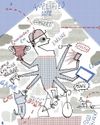Kellogg’s Maryam Kouchaki on understanding — and avoiding — ethical breakdowns.

For outsiders observing a scandal at a company or organization, the situation often seems implausible or incomprehensible. How did leaders let it happen? Why did so many people go along with the wrongdoing? And why did it go on for so long?
The view from inside a scandal-plagued organization is considerably different. We know that, in business as in life, good people sometimes do bad things — whether it’s a small lie or a giant fraud, a one-time act of dishonesty or an ongoing deception. Maryam Kouchaki, an assistant professor at Northwestern University’s Kellogg School of Management, has made understanding this phenomenon a prominent theme of her academic career. After studying physics as an undergrad in Tehran, and earning an MBA along the way, Kouchaki came to the U.S. in 2007 to pursue a Ph.D. in organizational behavior at the University of Utah’s David Eccles School of Business. After two years as a postdoctoral fellow at the Edmond J. Safra Center for Ethics at Harvard University, she joined Kellogg in 2014.
Kouchaki studies the causes of unethical behavior, with a particular focus on how psychology and human nature come into play. She’s found that anxiety-inducing music makes people more likely to cheat, for example, and that cheaters are more likely to have fuzzy memories of their misdeeds. But she’s not simply interested in documenting and diagnosing our failings. In Kouchaki’s view, we humans may be hardwired to react and behave in certain ways that may not always make us proud, but we are by no means a lost cause. And so she looks for interventions that can help people behave morally and become emboldened to speak up when they witness wrongdoing.
This story is from the Summer 2017 edition of strategy+business.
Start your 7-day Magzter GOLD free trial to access thousands of curated premium stories, and 8,500+ magazines and newspapers.
Already a subscriber ? Sign In
This story is from the Summer 2017 edition of strategy+business.
Start your 7-day Magzter GOLD free trial to access thousands of curated premium stories, and 8,500+ magazines and newspapers.
Already a subscriber? Sign In

Transforming information into insight
Focus on six organizational elements to build a world-class data and insights capability.

THE URGENT NEED FOR SOPHISTICATED LEADERSHIP
The pandemic has highlighted a series of paradoxes inherent to the work of leaders. What comes next will depend on how well leaders face up to them.

The road to successful change is lined with trade-offs
Rather than trying to convince people your change initiative is the right one, invite them to talk openly about what it might take to implement it: the good, the bad, and the frustrating.

Sustaining productivity virtually
Maintaining productivity levels among remote employees is an enduring challenge. Here are five ways to help businesses and employees thrive while people work at home.

FORWARD TO normal
Entertainment and media companies are building business models that are resilient to the enduring changes in consumer behavior ushered in by COVID-19.

How leaders can promote racial justice in the workplace
Embrace four principles to turn today’s diversity, equity, and inclusion initiatives into sustained progress.

CREATING THE OFFICE OF THE FUTURE
In a remodeled world, it is vital for companies to reinvent ways of working.

Consumer companies must take leaps, not steps
As shoppers show how quickly they can adapt to external shocks, retailers will need to radically reconfigure their business models.

Businesses can fast-track innovation to help during a crisis
“Unrealistic” timelines can actually work. Here’s how.

Agility and experience management work better together
Many companies achieve early wins with separate transformational efforts, then stall. But if combined and enhanced using “return on experience,” or ROX, measures, these two programs can unlock each other’s potential.